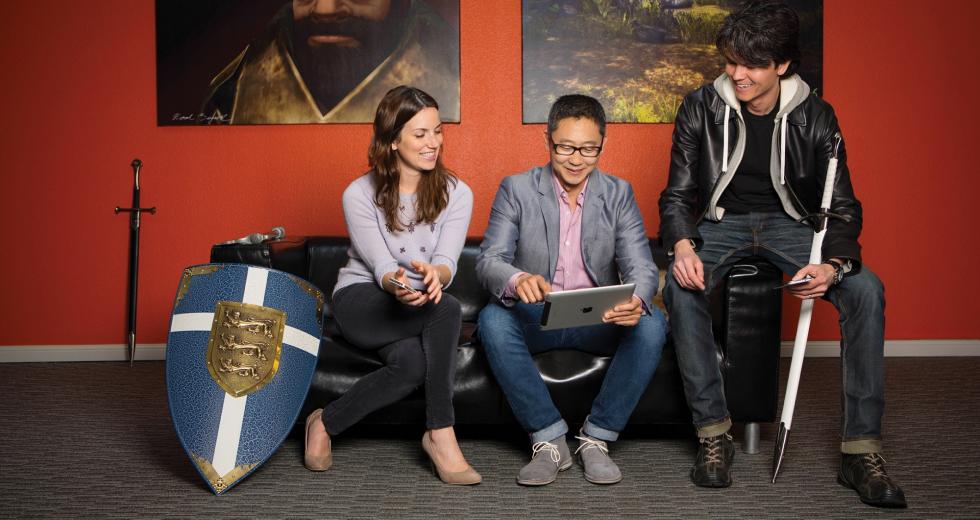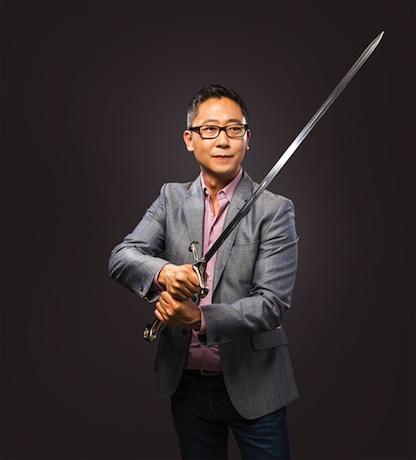A virtual whiteboard notes the outlines of a new mobile game pitch (top secret), and lots of talk about “following ourselves” and “keeping control of the vision.”
It’s a common scene at any of the hundreds of Silicon Valley or Bay Area tech companies. The difference is that this one — Capital Games — is in the heart of Sacramento’s midtown, in a building that started life as a mortuary.
Its CEO and co-founder, Mark Otero, sits crossed-legged on a bench behind the table. He’s a guy who knows all too well how important it is to keep control of a vision — and how quickly momentum can spin into chaos.
Two and a half years ago, in late 2011, Otero sold his start-up (then called KlickNation) to American gaming empire Electronic Arts for a reported $35 million, making him one of the River City’s few tech millionaires. With tortoise-shell glasses, black hair just meeting grey, a slim-cut pinstriped jacket and jeans, Otero puts off a casual, sophisticated confidence. But that easy élan has been hard won.
By the start of 2012, just months after the acquisition by EA, Otero was so wracked by doubt and anxiety that he considered abandoning the company he had dreamed of building since boyhood. Like many entrepreneurs, he found a downside to success. He lost the control and autonomy fundamental to who he was and how he led. Overnight, he had superiors — smart ones — with expectations and rules.
“I almost decided to quit,” he says. “I woke up a
multimillionaire. But you know what? It doesn’t strike you.
Instead, what you’re thinking is, ‘OK, all right. Now we’re in
this new world. I suddenly don’t feel so smart anymore.’ You go
back to feeling insecure about your knowledge, and you forget
about the reasons they hired you. That’s what happened to
me.”
Quitting wasn’t unimaginable to Otero. He had enough upfront
money to keep him rich for a long time, he was unhappy and
stressed, and he had abandoned success before. In 2006, he dumped
a lucrative financial career at Franklin Templeton Investments
and founded a midtown yogurt shop called Mochii to generate the
money and time to pursue his passion — role-playing games. A
Dungeons & Dragons obsessive, he fantasized about creating
complex virtual worlds of his own, and he didn’t mind gambling
his security to do it. He figured he needed a small business to
generate revenue, and in the middle of the Pinkberry craze, he
zeroed in on cold comforts in Styrofoam cups. So between fro-yo
transactions (he didn’t have the cash for full-time staff), he
and a small team crowded into a loft above the store and designed
gaming apps.
There were struggles. There were troubles with the IRS about unpaid taxes. There were flavors called Zang and Tiger’s Blood. He lost a lot of money and then made some back. But he believed he would ultimately make this bootstrap endeavor work. And in the end, he had KlickNation, a company successful enough — with the right mix of talent, vision and revenue (he says he was a millionaire before he sold) — to entice takeover and venture capital offers.
In January 2011, KlickNation’s revenues leaked to the press despite the fact that Otero didn’t yet want public scrutiny. “I don’t know exactly how it got out, but it began to surface,” says Otero, who can’t discuss his financials, then or now. The numbers were attractive. A trio of suitors came calling with eight-figure bouquets; two wanted to buy him outright, and one venture capital company wanted to invest. He opened the door to all three, wanting competition for the best deal. But for the next six months, he was the one pushing to prove himself. KlickNation as a company and Otero as an entrepreneur went through an intensive, exhausting disclosure process that caused his already-lean body to shed 10 pounds under the stress.
“When they say vetting, that’s a kind word for incredible interrogation and interviews,” says Otero of EA’s due diligence, which proved to be the toughest. “They bring their top experts in all different lines of business, and they come here and they grill you.”
EA repeatedly talked to all of Otero’s top management, pulling them away from their regular jobs. That caused tremendous pressure on daily operations, he says. “Your key people are the very people needed to be interviewed and prepare presentations, spreadsheets, financial outlooks,” he says. “You’re doing this, and you don’t want to disrupt the business. The worst thing that could happen is your business deteriorates during this time, and sometimes it does.”
Michael Chang, the former senior director of corporate development at EA, recalls the “head-to-head competition.” Chang, a takeover specialist, had put KlickNation on EA’s radar. EA was weathering criticism for being too focused on gaming consoles as its key platform and was looking to expand into social network apps; Facebook gaming was hot. Rather than dive into an arena in which it had little experience, EA wanted to piggyback on established developers.
“Here we had a ready-built team,” Chang says, pointing to KlickNation’s recognized success with games like “Superhero City.”
For Otero’s part, Electronic Arts had an allure above the other options. “What specifically stood out for me at EA was a history of making blockbuster games,” he says, launching into a habit of verbal listmaking. “Two, they have a history of being able to scale games to a wide audience across the world. Three, they have leaders I look up to.”
In 2007, EA had purchased Canadian game-maker BioWare, a company founded by Ray Muzyka, an icon in the gaming world and Otero’s personal hero. KlickNation would be a part of the BioWare division — turning Otero’s idol into a colleague. It was too good to pass up.
Chang managed to wrangle an hour with former EA CEO John Riccitiello to meet with Otero. “We put John and Mark in a room and tell Mark, ‘You’ve got one hour to explain to John why you understand free-to-play gamers and why we should buy you. If you want to get this deal done, convince him,’” recalls Chang. “The meeting, which was only supposed to last an hour, lasts two hours. At the end of that meeting, that is when we knew.”
Even as the ink dried on the contracts, doubts began creeping into Otero’s head. “You go through a bit of a culture shock as your company gets acquired,” he says. “You’re not the boss anymore. Suddenly, you’ve got multiple bosses. And there’s a different language. That’s with every company, right? There’s a socialization process.”
In the months after he sold, Otero says he began to “question everything” and felt increasingly distant from the company he founded. He had once been a hands-on boss (read: micromanager) who kept his desk in the hallway to improve his accessibility. Now, confidential EA calls meant he needed an enclosed space. He moved into an office and away from the camaraderie of the cubicles, with its free flow of information and sense of equality. His new duties involved traveling to other EA studios around the world for educational tours. For a guy so passionate about the “small town” charm of Sacramento, he suddenly found himself out of the city more often than not.
“I could see that he wasn’t as connected here,” says Aaron Nemoyten, a longtime employee and one of Otero’s original above-the-yogurt-shop developers. “We all knew that there was a lot of Mark driving around and going with his superiors and flying to different studios and talking to them about stuff. For a while, I chalked that up to, ‘He’s doing important-person things.’ But eventually we saw that there were some cultural issues.”
Otero wasn’t the only one from KlickNation grappling with the new corporate overlords. “Not everyone was compatible with the acquisition,” he admits. “It was a process of shaking out.” Employees quit, others felt slighted by the terms of the deal and eventually took to online chat boards to voice their grievances publicly. They began to grumble anonymously that long-term employees hadn’t made their fair share in the buyout, that the working conditions with long hours and no overtime were illegal, that parts of games were pirated and that Otero was a difficult and inept manager.
In the midst of internal upheaval, KlickNation’s business model took a near-death blow. Zynga, the darling of the Facebook-game world and the maker of hits like “FarmVille,” went public at the end of 2011 with a much-anticipated IPO that shocked the market by fizzling on the first day of trading.
“People realized that the opportunity on social (media) was maybe not as attractive as we thought,” says Otero, admitting that even he had doubts. “Because now we have a company like Zynga who can disclose their key metrics and … there was a disconnect between reality and perception.” In a matter of days, sentiment turned against social network games as the future and fastened on the rising market for mobile games. Suddenly, KlickNation’s entire paradigm seemed questionable, even to Otero.
Otero spent the next three months deciding whether to jump ship. He spent long hours over wine at Sacramento’s 58 Degrees & Holding Co. talking with a mentor about what he should do. He canvassed other entrepreneurs for their opinions. “For me, it was either quit or fully commit,” he says. “I thought, ‘If I quit, I’m a loser.’ Two, I don’t want to disappoint everyone here. Three, I have a social contract that I felt responsible for, an obligation. Lastly, I remember reading that it’s not so much how you enter; it’s even more important how you exit.”
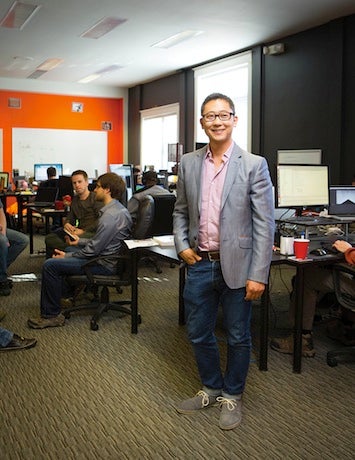
Direct and outgoing by nature, Otero also took his misgivings to
his new superiors. Chang, who has seen the takeover process
dozens of times, told Otero to
give it time and wait out the
jitters.
“Everyone has some point of self-reflection, and you just have to
be calm about it, mature,” says Chang.
“It’s so hard, right?” says Otero of facing his choices. “What if I didn’t make the right decision?” But one piece of solicited advice stood out: Be decisive. Whatever you do, commit to it and move forward. And so Otero decided to stay — but this time, he would use a new game plan, one that shifted his business model away from desktops and onto handheld devices. “The thing about planning and strategy is the options,” he says. He chose to “become aggressive about leading change.”
“I ended up relying more on EA to do all the thinking for me,” he says. “I realized they were looking for leadership, and they wanted us to continue to retain our boldness, our execution, our start-up mentality. They didn’t want us to lose that. I’m not saying that was lost, but we kind of ignored it because we were just so bright-eyed and everything EA said was right. And then you realize eight, nine months in, ‘Oh no, no, no. We actually know how to do this, and we’re going to own it.’ I told my boss, ‘Hey, I’m going to commit; this is going to be successful.’”
Otero quickly abandoned the shrinking market for computer-based offerings and focused Capital Games on developing role-playing adventures for Smartphones and tablets. Nemoyten says it was such a rapid shift that it literally happened almost overnight while he was on vacation. “When they called me to tell me, I was driving with my girlfriend from Newport Beach to Houston,” he recalls. “They were like, ‘Hey, so just want to let you know we’re switching to mobile.’”
While the two sectors share similarities, they differ drastically in screen size and user interaction (mouse vs. touch). Those are just the surface details. In reality, Otero was asking EA to let him build a different company than the one it had purchased, in a field Otero knew nothing about.
“That sort of change is really difficult to manage,” says BioWare GM Canada Aaryn Flynn. “The only silver lining was that it was affecting a lot of people at Electronic Arts, so there were people to talk to and work with. Looking back, it was definitely the right strategic change, and we’ve supported them in that transition 100 percent.”
Otero and his team focused on an established property called “Heroes of the Dragon Age” (based on the popular BioWare series “Dragon Age”), and things started to gel. “We had a meeting with the Dragon Age development leads in Edmonton early in the process,” says Flynn. “After talking to Mark and some members of the team making that game, my confidence grew tremendously.”
Despite the liabilities of venturing in an unknown direction with an untested team, EA remained supportive. “During this whole time, EA probably could’ve shut us down, right? They could’ve said, ‘You know what? You guys have never done mobile before. How do you think you’re going to figure out mobile?’ Instead, what EA did was say, ‘Hey, we’re going to give you guys time to figure this out, but of course we want you to demonstrate it.’”
“Heroes of the Dragon Age” launched successfully in 2013 into a marketplace experiencing exponential growth (recently, it ranked in the top 100 game downloads in the Apple app store). “Mobile games are essentially the fastest-growing game category,” says Brian Blau, a consumer technology analyst with research company Gartner. Mobile games tallied $13 billion in revenue in 2013 and are expected to see 25 percent annual compounded growth for the next few years. Sixty percent of revenue in the mobile apps market is from the game category, according to Gartner.
Now, with success manifested, morale up and the bosses happy, Capital Games has two products in development and more on the horizon. Its 10,000 square feet of cubicled space is quickly filling up with new hires — more than a half-dozen job vacancies are currently posted, and Otero says 2014 will be a year of growth. On a recent day, the offices are a warren of activity, with people roaming freely from desk to desk, popping sodas from the free machine and playing “Heroes” under the guise of work. In one glass-enclosed alcove, a group chats while watching a movie that may eventually become a game. Upstairs, the development team is fixing glitches in real time, while dogs of all sizes wander around the workstations. Otero walks from room to room, a bounce in his quick step, fully involved, totally engaged.
“I think that he’s matured a lot in a relatively short period of time,” says Nemoyten, who remains with the company. “This experience would do that to anyone. When I first met him, he was in start-up, co-founder, panic mode all the time because [KlickNation] wasn’t profitable, and he was dumping money into it from the yogurt shop and working crazy hours. Now, he’s doing stuff with that money and resources and connections.”
And while Otero confesses he is “always paranoid, always waiting for the other shoe to drop,” he also claims to be having fun again.
“Part of my unhappiness six to eight months ago stemmed from the fact that I didn’t have the confidence to build an organization around the people that we have. What I’m very confident in now is designing an organization that works for the people we have, including myself,” he says. “There are no guidelines. I thought there was a template. There’s not.”
Recommended For You
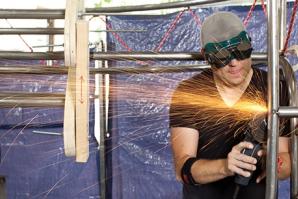
Independents’ Day
Look out 9-to-5, the freelancers are coming
Casey Marshall is hunched over his phone, furiously scrolling through his Twitter feed in search of a photo of Waste Management’s promotional robot, whose broken axle he fixed back in March. “Someone came into the Hacker Lab and needed his robot repaired,” he says, grinning, “and I was like, ‘I gotta do that.’”
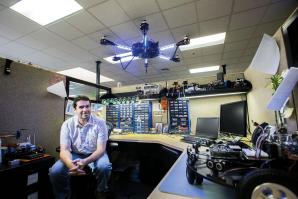
Batteries Not Included
The grand design of Rocklin's Parallax Inc.
It’s a case of David versus Goliath. A tiny, privately held Rocklin company is taking on multimillion-dollar competitors with a lightning-fast technology that’s more sophisticated than the competition’s.



